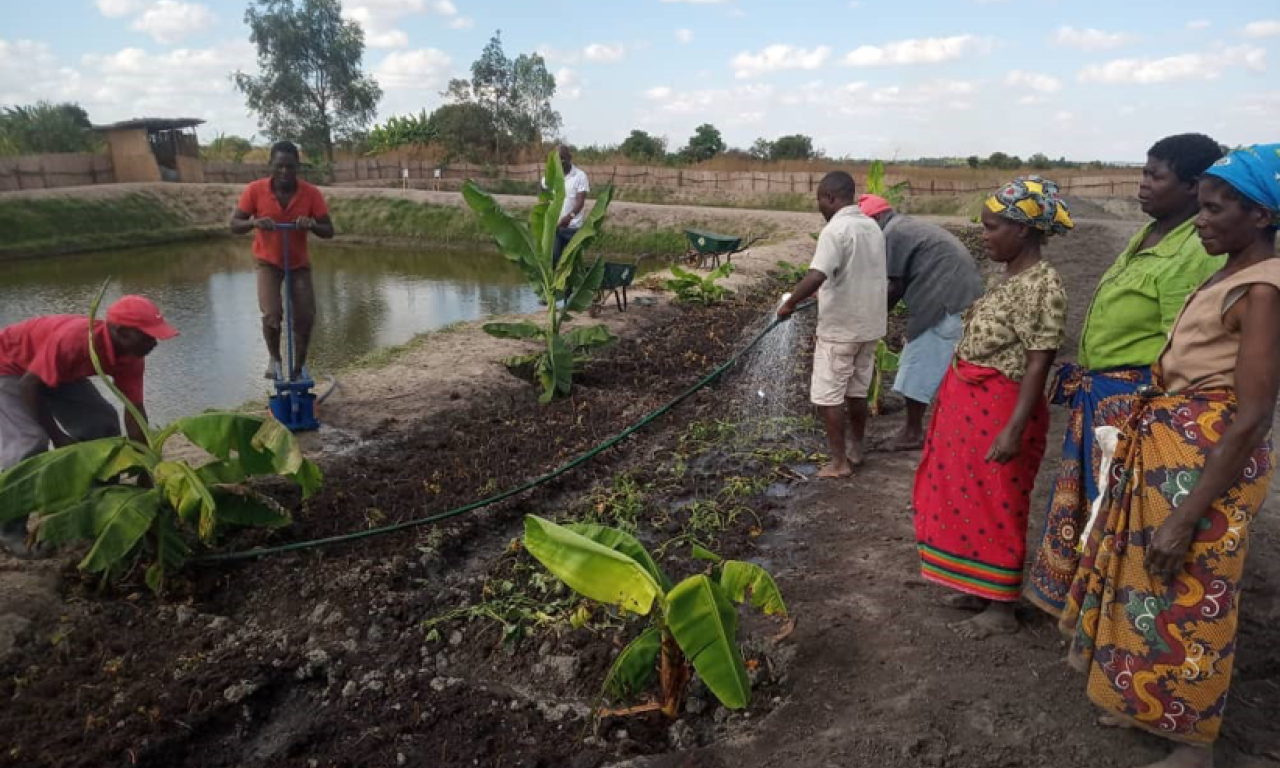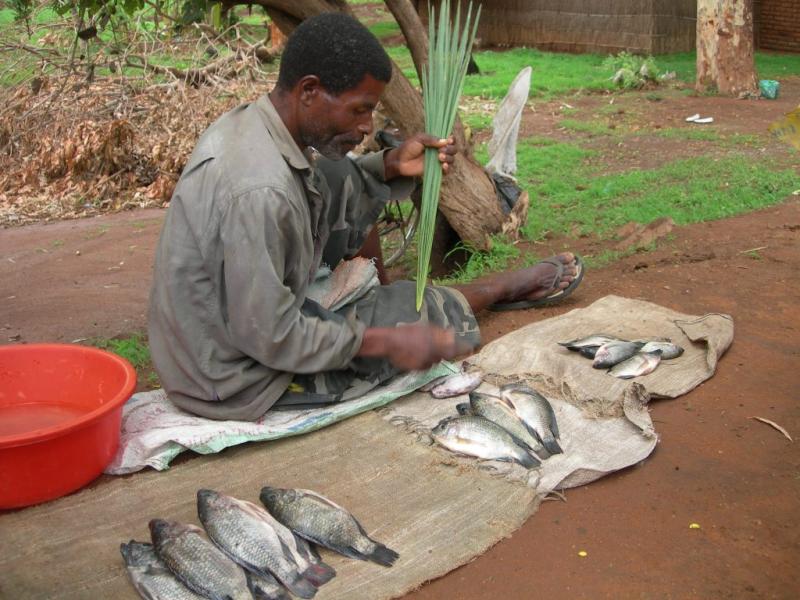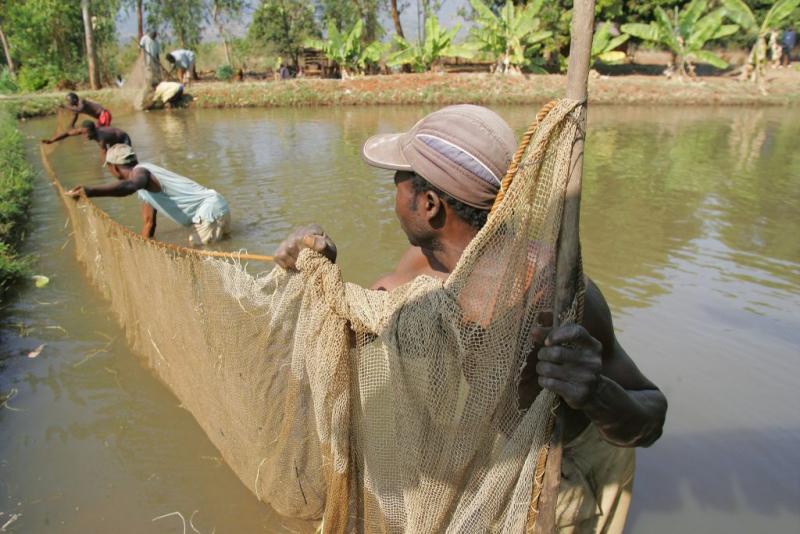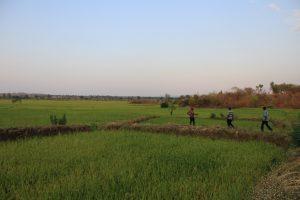
In Malawi, land and aquatic food systems engage 80 percent of the population playing a key role in food security, employment and economic growth. However, the increasing impacts of climate change are threatening the productivity of small-scale producers. Increased temperatures and erratic weather have led to drought and flooding, causing shorter growing seasons, poor crop yields, food shortages, hunger and the spread of disease in a country already struggling to achieve food and nutrition security.
In an effort to boost small-scale producers' ability to adapt and mitigate climate change in Malawi, WorldFish has partnered with other agricultural research centers in the CGIAR, the world’s largest agricultural innovation network, and the Malawi government to launch a multidisciplinary research for development aimed at equipping small-scale producers with climate-smart innovations.
“Scientific predictions attest that these adverse climatic conditions will continue in the next decade, affecting the food and nutrition security of the people, especially smallholder farmers,” said the Director of Malawi’s Department of Agriculture Research and Services, Wilson Makumba, at the launch of the Development of Smart Innovation through Research Agriculture (DeSIRA) project.
In line with Malawi’s climate change adaptation strategy, DeSIRA will focus on the development of climate-resilient integrated technological innovations. The multidisciplinary research project, funded by the European Union (EU), seeks to identify scalable climate-smart innovations to improve productivity, profitability, and sustainability of land and water systems in Malawi, said Makumba.
WorldFish and partners will focus on the development of climatic resilience technological innovations, which will involve the development of diversified crop and livestock production systems, robust in integrated pest and disease management strategies to predict, monitor and control existing and emerging biotic threats to improve agriculture technology management.

Institutions under DeSIRA will work together to address the complex, diverse and changing constraints through the development and dissemination of multidisciplinary and integrated technologies appropriate for Malawi’s agri-food systems. The project led by the International Potato Center (CIP) will draw on an already existing strong collaboration between the national research system, CGIAR centers, Malawi’s Department of Agricultural Research Services (DARS), CIRAD and the University of Liège.
WorldFish will take lead in piloting fish integrated technologies, including testing alternative fish feed ingredients such as cassava chips, sweet potato peels, agroforestry tree leaves and seeds, said WorldFish’s Director for Southern Africa Victor Siamudaala.
“WorldFish will use its research expertise to improve the productivity, profitability, and sustainability of aquatic food systems by evaluating integrated fish-rice systems through evidence-based assessment, developing and test android-based application for early detection and control of fish diseases and parasites,” he said.
The information and knowledge generated through these studies will fill critical knowledge gaps and further inform policymakers and upscaling partners about the potential of integrated technological options in contributing to climate change-resilience and sustainability, he added.
The project has a special focus on getting research outcomes into the hands of small-scale producers. Once research has identified climate-smart innovations, the close links with government and other organizations will aim to make technologies widely available to farmers social-economic analysis of barriers to adoption, as well as the available opportunities and conditions required to increase technology uptake, said the Director of the Department of Agriculture Research and Services at the project launch.

“Activities will involve the establishment of on stations experiments, at various research stations and on farm trails which will allow the full participation of farmers and other stakeholders’ technology evaluations. This will also allow farmers to select technologies that can be easily adopted and managed on their own thereafter,” he explained.
This approach is also expected to foster joint learning and also help non-governmental organizations and other partners at the district level to continue supporting the farming communities in accessing and using their most preferred technologies after the end of the project.
Makumba said this project was timely as it came at a point when people’s employment and livelihoods are threatened by the effects of the COVID-19 pandemic.
“Sustainable integrated technologies that ensure food and nutrition security and income generation in the context of climate change are urgently needed,” he said. He also mentioned that the project is special in that it promotes cross-sector collaboration through the clustering of scientists from various CGIAR centers, local and national institutions.
About the DeSIRA-Malawi Project

The DeSIRA Malawi will however implement under a budget of EURO 6, 315, 790, over five years (December 2019-December 2024) in the Northern and Central parts of Malawi, particularly Mzimba, Chitipa, Karonga, Nkhata Bay, Nkhotakota, Kasungu, Salima, Mulanje, Thyolo and Chiradzulu Districts.
The Project will be led by International Potato Center (CIP) in partnership with WorldFish, International Center for Tropical Agriculture (CIAT), International Maize and Wheat Improvement Center (CIMMYT), World Agroforestry Centre (ICRAF), International Crops Research Institute for the Semi-Arid Tropics (ICRISAT), International Food Policy Research Institute (IFPRI) and International Institute of Tropical Agriculture (IITA), also National (Department of Agricultural Research Services (DARS), Department of Agriculture Extension Services (DAES) Department of Fisheries (DoF) and Lilongwe University of Agriculture and Natural Resources (LUANAR) and European The French Agricultural Research Centre for International Development (CIRAD), University of Liège (ULiège) and Wageningen Center for Development Innovation (WCDI) partners will play a critical role in the implementations.